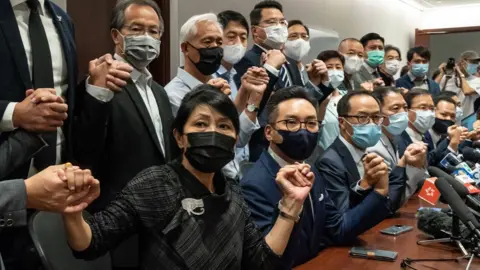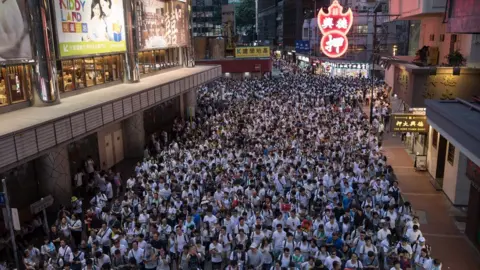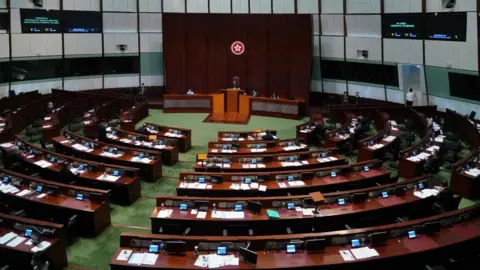Can Hong Kong's democracy movement survive the walkout?
 Getty Images
Getty ImagesThe mass resignation of pro-democracy lawmakers in Hong Kong has raised fresh questions about the future of the territory's democracy movement as its legislature is left with almost no dissenting voices.
"We had to," said Claudia Mo, one of 15 opposition politicians who announced a walkout on Wednesday.
"We owe a display of solidarity with our colleagues who were ousted. We need to protest against what could be the ultimate Beijing crackdown on Hong Kong - to silence the last bit of dissent in the city."
Ms Mo, who has served as a lawmaker for the last eight years, told the BBC they had wanted to hang on. But the sudden expulsion of four colleagues - minutes after Beijing passed a resolution allowing the territory to eject lawmakers without going to court - made it impossible to stay.
"They're lining us up to oust us bit by bit. What's the point of staying on like this, thinking will I be ousted today or not?"
 EPA
EPAHong Kong has witnessed a rapid erosion of its freedoms since Beijing imposed a deeply contested national security law on the city in June. It criminalised "secession, subversion and collusion with foreign forces" and has already led to several arrests.
The law has virtually silenced public protest after months of huge democracy demonstrations that only petered out as the coronavirus pandemic took hold.
For Ms Mo, Wednesday's ruling was "the final nail in the coffin of 'one country, two systems'", which, she added, "has been dead for quite some time".
At the time of handover in 1997, the former British colony was guaranteed more freedoms than mainland China for 50 years, including its own legal system and rights such as the freedom of assembly and speech.
But the national security law, which China says was necessary to restore stability to Hong Kong, has in effect criminalised dissent.
The expulsion on Wednesday "formally marked the end of any legal dissent" too, said Victoria Tin-bor Hui, an associate professor of political science at the University of Notre Dame.
Speaking to the BBC from New York, she said the lawmakers "had no good option".
"Even if they didn't resign today they would be picked out one by one," she said. "Beijing is trying to turn Hong Kong's legislature into the equivalent of the National People's Congress, which is a rubberstamp parliament."
The stage had already been set, according to Dr Hui. In July, the Hong Kong government disqualified 12 candidates from running in now postponed elections - including the four ousted lawmakers. Two weeks ago several pro-democracy politicians were arrested over scuffles in the legislature earlier this year - prosecutions that have been viewed as targeting Beijing's opponents.
Many are now asking if the departure of the city's lawmakers marks the end of Hong Kong's fight for democracy.
"I would not say so," said Ma Ngok, an associate professor at the Chinese University of Hong Kong.
"It's not the end because most people are still in full support of full democracy in Hong Kong," Dr Ma told the BBC, saying the pro-democracy group at parliament, and the movement at large, still has strong public support.
"People are angry but their expression is being supressed. The media is being controlled. They can't cast a vote. They can't go to the streets," he said.
 Getty Images
Getty ImagesBut the shape that future democratic opposition will take is increasingly uncertain.
"They need a new strategy," said Dr Ma. "A lot of the past movement focused on elections and getting votes from the public but there are limits to this strategy."
Young activists at the forefront of the anti-government protests last year dominated the unofficial pro-democracy primaries in July in a sign of how protesters saw the legislature as a means for change.
It's now unclear who could stand in any future vote.
"Some people may still choose to run. But the criteria for candidacy will be severely constrained by Beijing. It seems any kind of dissent can bring them disqualification," said Dr Ma.
For Joshua Wong, one of the most well-known activists of the youth movement, the fight goes on.
"Hong Kongers are the means for change in Hong Kong," he told the BBC, regardless of where "the battlefield " may be.
Online assembly, virtual protest, boycotts of pro-Beijing establishments and a campaign to free 12 Hong Kong activists detained in mainland China are just some of the ways in which activists still mobilise, he said.
All of this gives "much empowerment to the mass public who might not be able to serve on the forefront of the escalating protests", he added.
Some commentators have questioned the goal of the mass resignation beyond the symbolism it offered.
Professor Steve Tsang, director of the SOAS China Institute at the University of London, told BBC Chinese: "General resignation needs to be used sparingly and for an achievable specific objective. Unless there is an achievable specific objective, it should not be used."
Veteran political commentator Johnny YS Lau was also worried that the "rules of the game" for the election of Hong Kong's legislature and executive in 2021 may be changed with only pro-establishment lawmakers present.
But he saw the difficulties of staying put. "Would you want to stay and be a flower vase (merely political decoration)?" he said to BBC Chinese.
Ahead of handing in her formal resignation on Thursday, Ms Mo was writing an op-ed for Apple Daily, Hong Kong's popular pro-democracy tabloid, penning her reasons for leaving the legislature she had fought hard to enter.
"It's ok to lose. We might have lost this battle. But we are looking forward to the end of the war," she said. "We may be quitting the legislature at this point of time but we're not quitting the democracy fight."
